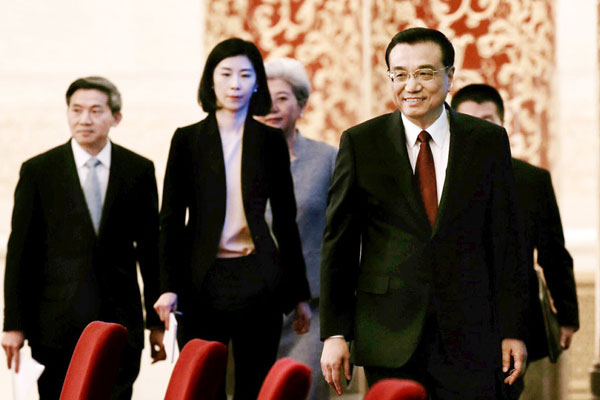 |
|
Premier Li Keqiang arrives for the news conference after the closing meeting of the fourth session of China's 12th National People's Congress at the Great Hall of the People in Beijing, March 16, 2016. [Photo by Xu Jingxing/chinadaily.com.cn] |
Li Keqiang: Streamlining administration and increasing transparency of government affairs are both essential for transforming government functions. There is no problem with the firm resolve of the central government to increase the openness of government affairs, and further steps will be taken in this respect. First, any information that can be made public should be released. So openness will be standard practice, whereas the lack of this an exception. More information needs to be made public if it concerns an issue that involves public interests or it concerns the balance sheet of public finances. We should make government information as easily accessible for our people as just one click away.
Second, we need to upload as much information as possible onto the Internet. We need to release the government list of powers, and this will help us narrow the space for any fraudulent use of office. People used to say, "As man is doing, heaven is watching." I guess in this era of cloud computing, it should be, "Cloud is watching, watching how power is being used," and in the exercise of power by governmental departments, there should be no practice of making calculating moves for personal gain.
Third, the government needs to actively respond to public concerns. When we introduce a particular policy, if people have any questions or doubts about the policy, the government has the duty to give necessary explanations and even revise the policy by drawing reasonable suggestions and ideas from the general public. We need to ensure that people are fully clear about what our government policies are about. Before the two sessions opened this year, I had asked all ministers in the State Council to be more proactive in talking to the press. Was there not a passage in the Great Hall of the People for ministers to appear before the press to take their questions? What I said to the ministers is that whenever you encounter journalists, you should no longer just wave your hand and take a quick leave, rather, you need to open your mouth and answer questions straightforward. From what I heard, the performance of ministers has been warmly welcomed and received by the press.
Increasing openness in government affairs will help ensure that the use of government power is properly supervised, government efficiency can be enhanced and institutional safeguards can be provided against misuse of office. So we will continue to welcome supervision from the media and the general public. Thank you.